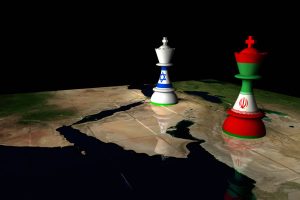German-Israeli Relationship ‘Gives Hope to All Mankind,’ Netanyahu Says

“Despite the unparalleled horrors of the past, our two peoples have forged a unique and constructive friendship,” Netanyahu told German Chancellor Merkel in Berlin.
Prime Minister Benjamin Netanyahu, meeting with German Chancellor Angela Merkel in Berlin Tuesday, expressed the significance of German-Israeli cooperation.
“This meeting was a further demonstration of our relationship, which celebrated its 50th anniversary,” the Israeli leader said, referring to 50 years since the two countries established diplomatic relations.
“In that half century, we have built a unique relationship and partnership that has significance far beyond the confines of this hall because it doesn’t only bring tangible benefits to both our countries, but it also gives hope to all mankind,” he continued. “It’s an example of how, despite the unparalleled horrors of the past, our two peoples have forged a unique and constructive friendship.”
Germany has become one of Israel’s closest friends in Europe. Germany continues to pay reparations to Holocaust survivors to this day.

PM Benjamin Netanyahu and his wife Sara seen with German Chancellor Angela Merkel at a Yad Vashem exhibition in the History Museum in Berlin, Germany, on Tuesday. (Amos Ben Gershom/GPO)
“This was our sixth Israel-Germany Government-to-Government meeting,” noted the prime minister. “These regular G2G meetings are a testament to the unique partnership which we have today between our nations and they clearly demonstrate the breadth and scope of the cooperation between our two countries.”
Netanyahu referenced a number of sectors in which Germany and Israel cooperate with one another, including cyber security, counter-terrorism, energy, water, technology, and innovation. “All of these things are concrete and they’re moving forward,” he said.
“In these and many other areas, our cooperation enables both Germans and Israelis to better meet the challenges and the threats as well as to seize the technological and scientific promise of the future,” he added. “By cooperating, we make each other stronger and we are better able to innovate, and the future belongs to those who innovate.”
By: Jonathan Benedek/TPS

























